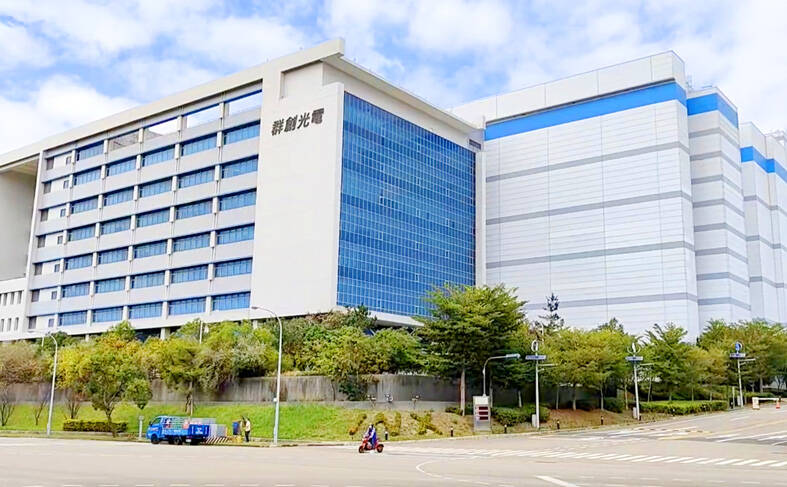Innolux Corp (群創) yesterday said it is seeking to optimize operations amid a lingering industry downcycle, while a news site reported that the LCD panel maker would cut 100 jobs at a factory in Miaoli County.
The Chinese-language Nextapple News Web site, citing an Innolux employee, yesterday reported that the Miaoli-based company asked about 100 people to resign.
Most of the workers are at the company’s T1 factory in Miaoli, where it makes less advanced panels, the report said.

Photo provided by a reader via CNA
The severance program is to take effect on Monday next week, the report said.
Like its peers, Innolux is cutting factory utilization to buffer against falling panel prices.
Although Innolux confirmed it was making workforce adjustments, it did not disclose details or say how many workers would be affected.
“After a careful and extensive evaluation, the company will streamline its management entirely,” it said in a statement. “The main measures will encompass optimal adjustments in structure and production lines, with an aim to strengthen the company’s development and business deployments.”
The manufacturer said it has communicated with affected employees, and would seek to make appropriate arrangements and work allocations.
Innolux reported a net loss of NT$1.9 billion (NT$60.3 million) last quarter, compared with a loss of NT$5.47 billion in the second quarter.
That was the company’s sixth straight quarter of losses as adverse macroeconomic conditions affected customer demand, while high inflation depressed consumer spending.
Consolidated revenue in the first 11 months of the year fell 7 percent year-on-year to NT$193.07 billion, the company said in a regulatory filing last week.
Innolux is pinning its hopes on a turnaround next year, as the Olympic Games and other major sporting events could stimulate demand for TVs and related components, Innolux president James Yang (楊柱祥) told reporters last week.
The introduction of new smartphones and notebook computers with artificial intelligence capabilities would also help boost panel demand, he said.

CHIP WAR: Tariffs on Taiwanese chips would prompt companies to move their factories, but not necessarily to the US, unleashing a ‘global cross-sector tariff war’ US President Donald Trump would “shoot himself in the foot” if he follows through on his recent pledge to impose higher tariffs on Taiwanese and other foreign semiconductors entering the US, analysts said. Trump’s plans to raise tariffs on chips manufactured in Taiwan to as high as 100 percent would backfire, macroeconomist Henry Wu (吳嘉隆) said. He would “shoot himself in the foot,” Wu said on Saturday, as such economic measures would lead Taiwanese chip suppliers to pass on additional costs to their US clients and consumers, and ultimately cause another wave of inflation. Trump has claimed that Taiwan took up to

A start-up in Mexico is trying to help get a handle on one coastal city’s plastic waste problem by converting it into gasoline, diesel and other fuels. With less than 10 percent of the world’s plastics being recycled, Petgas’ idea is that rather than letting discarded plastic become waste, it can become productive again as fuel. Petgas developed a machine in the port city of Boca del Rio that uses pyrolysis, a thermodynamic process that heats plastics in the absence of oxygen, breaking it down to produce gasoline, diesel, kerosene, paraffin and coke. Petgas chief technology officer Carlos Parraguirre Diaz said that in

Japan intends to closely monitor the impact on its currency of US President Donald Trump’s new tariffs and is worried about the international fallout from the trade imposts, Japanese Minister of Finance Katsunobu Kato said. “We need to carefully see how the exchange rate and other factors will be affected and what form US monetary policy will take in the future,” Kato said yesterday in an interview with Fuji Television. Japan is very concerned about how the tariffs might impact the global economy, he added. Kato spoke as nations and firms brace for potential repercussions after Trump unleashed the first salvo of

SUPPORT: The government said it would help firms deal with supply disruptions, after Trump signed orders imposing tariffs of 25 percent on imports from Canada and Mexico The government pledged to help companies with operations in Mexico, such as iPhone assembler Hon Hai Precision Industry Co (鴻海精密), also known as Foxconn Technology Group (富士康科技集團), shift production lines and investment if needed to deal with higher US tariffs. The Ministry of Economic Affairs yesterday announced measures to help local firms cope with the US tariff increases on Canada, Mexico, China and other potential areas. The ministry said that it would establish an investment and trade service center in the US to help Taiwanese firms assess the investment environment in different US states, plan supply chain relocation strategies and